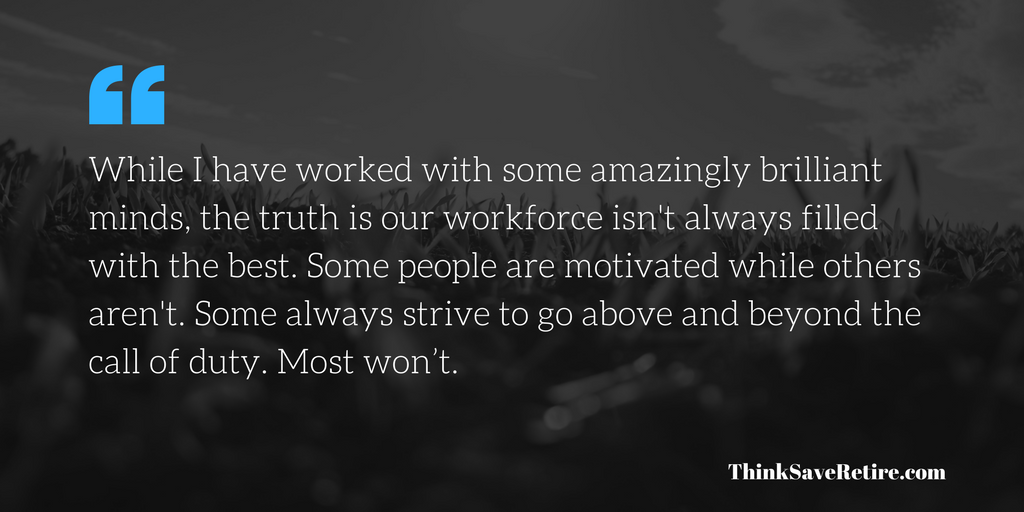Seven truths that turned out to be myths in my 20s
My 20s was a remarkable time in my life. It was a time where I discovered that a lot of the things I considered to be truth were, in fact, myths. Ugh!

My 20s was a remarkable period of time in my life. I started my first full-time job after college and began putting my adult life together. Along with this process came the realization that so much of what I believed as a child was, to put it plainly, bunk.
It is amazing what watching television and reading so-called experts on the Internet can do to otherwise healthy minds. As a wee lad, I had certain expectations about reality...things that my 20s quickly put into some serious eye-opening perspective for me.
In short, I set my expectations for society way the heck too high.
Truths that turned out to be myths in my 20s
1. Everybody in the workforce is the best of their breed
While I have worked with some amazingly brilliant minds, the truth is our workforce isn't always filled with the best. Some people are motivated while others aren't. Some have a work ethic, others don't. Some always strive to go above and beyond the call of duty. Most won't. Like I wrote in another blog post, showing up is half the battle (and this is the other half), and looking good isn't all that tough these days.
In the comments section below, Vicki from Make Smarter Decisions put it best: "I always wanted to believe the best about others so it took a long time to get past that one! People are motivated by different things – and yes, some just don’t seem to be motivated by much. I always believed if we worked as a team we could get things done better and faster – but often that was bunk".

2. Managers need to be ruthless dictators to effectively control their staff
I'm not sure why I believed this, but I had always assumed that managers in corporate America needed to govern their staff like drill sergeants in the Army. Not necessarily the yelling aspect, but maintain a very tight control over everything that happens, all the time. I've worked with folks like this, and it is remarkable how dictatorial leadership stifles creativity and harbors deep resentment and prolonged animosity at virtually all levels of the organization. I understand the need for this type of leadership in the military, but in corporate America, it is often damaging.
Then again, a managerial style that is too loose can also leave staff wandering aimlessly through the workday, goofing off and checking their social media accounts and personal email during working hours. Not enough control is just as bad as too much.
As with much of life, balance is the key.
3. There is always time to do "Fun Task X" later
Throughout my early career, I largely put my hobbies on hold, telling myself that there will always be time later to do them. Always, later. Keep telling yourself this over and over again and you eventually start to believe it. Eventually, "later" never comes. And that sucks.
Do not let life get in the way of pursuing what makes you happy. Easier written than done, but understanding that life isn't always fair is an important step towards prioritizing your happiness over everything else. Find time to pursue your hobbies. Don't relegate them to "later", because life is short, and we never know what later is going to entail.
4. Owning a home is the mark of success and builds equity
The biggest financial mistake that I've made in my life was owning a home. The worst part about this, though, was why I owned a home. I owned a home because I thought that is what "success" in this country meant. I told myself that I was tired of renting and wanted a place of my own to start building some equity. And so I bought my depreciating asset, sunk money into it in the form of upgrades and repairs. All told, I've conservatively lost between $70 to $80k over the years.
While it is possible to make money on real estate, it is much tougher than many think, especially with your main home. Homeownership, to me, is entirely overrated - an expensive lesson to learn.
5. I will probably wind up wanting kids one day
I never saw myself having children. That desire to raise kids? Yeah, it was never there. Never an itch. An inkling. A "well, maybe...". Just, nothing. Naturally, most people thought that feeling would change with time, because having kids is inevitable.
Virtually everyone around me (everyone with kids, anyway!) said they felt the same way, but their 20s magically changed that feeling over to "Actually, I want kids!". Most people assumed that I'd "come around" and do what seems to be natural - have kids. For a while, I actually believed it. I mean, if it's happening to everybody else, surely it'll happen to me, too. Right? After all, this is probably just "a phase" or something. "Don't worry, you'll want kids", someone once said to me.
I was never worried.
I never ended up wanting kids and definitely don't see my wife and I popping out some children. We're DINKs for life, and we're proud of that because it's a decision that works the best for us. If you've never wanted kids, then sometimes, there may truly be something to that!
6. There is always a right way and a wrong way to do things
Perhaps the most important lesson of all - there are different ways to do things, but that doesn't necessarily make them right or wrong. They are just different. I have a certain way of accomplishing a task. My wife might have another way. Our neighbors probably have yet another. And that's all great! No law [currently] exists that requires us to perform tasks the very same way, all the time. How boring would that be? And, we don't always have to be right.
I used to argue my point more forcefully in my younger years, insisting that even if I didn't change someone's mind, at least they understood my position. Today, I let things go much more easily. People's belief systems will always be different than mine, and it's a waste of my time trying to install something that I believe into the mind of someone else. More times than not, it just doesn't matter.
7. A million bucks is nothing these days and certainly not enough to retire on
I distinctly remember believing that a million isn't all that much money anymore. And if you live like a traditional American, that might be true. But for many of us who have taken personal finance by the horns and discovered what enough means to us, a million dollars is plenty! In fact, my wife and I won't even have a million by the time that we retire from full-time work at the end of the year. Why? We simply don't need that much, and it's not worth the additional time working full-time jobs in order to acquire additional wealth. We prioritize happiness over wealth. We've already accumulated.
What say you? What did you believe as a child that your 20s revealed to be entirely bunk?
This article was originally published on June 27th, 2016 and has been updated to include better information and a more accurate representation of this blog.